Test data from both the lab and real-world applications fuel an Expert System data base that helps designers select an optimum bearing in seconds, not hours.
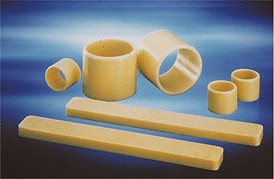
Offering more design opportunities high-performance plastic bearings have emerged as a viable, cost-effective alternative to metal or ball bearings.
During the last two decades a revolution has taken place in the advancement and use of highly engineered polymers in bearing applications. Today, many manufacturers are focused solely on creating tribological plastics for bearing development. These plastics come from years of lab testing and data mining in real-world applications. They are designed to handle high speeds, loads, and temperatures; caustic chemicals; and a wide array of other application factors.
Advanced synthetic compounds provide more design opportunities than traditional materials, and high-performance plastic bearings have emerged as a viable, cost-effective alternative to metal or ball bearings. They provide better vibration dampening, are corrosion-free, lightweight, and self-lubricating. Many economic and environmental advantages result from the freedom from maintenance and external lubricants plastic bearings offer.
Testing and predictability factors
Choosing the right bearing for an application for the first time is an important objective for many design engineers. It is critical to hire a vendor that can accurately calculate the life of a bearing according to wear rates, actual testing results, and specific application parameters. Often, standard bearing tests do not reflect how a bearing will perform under real loads. However, igus® provides an easy-to-use Expert System, a complimentary database, which predicts the life of its plastic bearings. Users enter the maximum loads, speeds, temperatures, and shaft and housing materials, which then prompts the system to calculate the appropriate plastic bearing and its expected lifetime based on real-world testing.
It is also essential for the predicted service life of a plastic bearing to correspond to its actual service life in an application. In order to do so, realistic testing methods must be used to characterize their tribological properties. In many cases, the tribological data gained from two standard tests–pin-on-disc and block-on-ring–cannot effectively be applied to bearing applications. Instead, it becomes essential to perform more realistic “bearing-on-shaft tests.”

Expert System is a complimentary database you can use to predict the life of igus plastic bearings. You enter loads, speeds, temperatures, and shaft and housing materials, and the system calculates the appropriate plastic bearing and its expected lifetime based on real-world testing.
The life expectancy of a polymer bearing should be calculated by using a database of friction and wear values, created from physically testing a wide array of plastic bearings running against an assortment of shafts. Factors like load, sliding speed, type of motion, and temperature should be considered when generating the data. Due to the complexity of the wear processes taking place, the test should be adapted as closely as possible to future, real-world applications.
Compare performance
It is also essential to understand both the advantages and disadvantages of the options available, because different types of bearings perform in different ways. When comparing three standard bearings such as metal bearings, sintered-bronze bearings, and polymer bearings, many distinctions appear.
For example, metal bearings are designed to handle heavy loads, high temperatures, and high speeds. Scheduled, periodic greasing decreases the coefficient of friction, but can also cause problems. When constant lubrication is not maintained, the bearing wears and fails prematurely, and dirt or dust attracted to the grease heightens this risk.
In sintered-bronze bearings, oil is drawn from the bearing as it rotates on the shaft (minimum speed of 200 ft/min), and the oil creates a thin film that separates the bearing and shaft, preventing wear and shaft damage. At high speeds, a low coefficient of friction is achieved. However, shaft oscillation, slow speeds, and irregular use or uneven loads can impede film lubrication from being maintained.

Different types of bearings perform in different ways. When comparing standard bearings such as metal bearings, sintered-bronze bearings, and polymer bearings, many distinctions appear. In sintered-bronze bearings, for example, oil is drawn from the bearing as it rotates on the shaft and creates a thin film that separates the bearing and shaft, preventing wear and shaft damage. Shaft oscillation, slow speeds, and irregular use or uneven loads can impede film lubrication from being maintained.
Self-lubricating polymer bearings contain solid lubricants embedded in millions of tiny chambers of the mostly fiber-reinforced material. During operation, the bearing transfers lubricant onto the shaft to help lower the coefficient of friction. Unlike a sintered-bronze bushing, polymer bearings release solid lubricants as soon as the bearing or shaft is set in motion. The fiber-reinforced materials inside the bearing withstand high forces or edge loads. Also, plastic bearings can be used on many different shaft types.
As a matter of caution, do not confuse a plastic bearing with a polymer-coated plain bearing, which is a much older technology. These type of bushings consists of a metal shell and a thin polymer coating (usually PTFE or Teflon) applied to the inside. The difference is that the layer cannot withstand high edge loads or oscillating movements and is gradually stripped off.
Although plastic bearings have many benefits, they do have some limitations. In extremely high-temperature environments or applications with constant high speeds, their performance can be compromised. Too much wear can lead to failure. For such applications, bearings comprised of a thermoplastic base material are ideal. Another type is specially designed for long-term temperatures reaching 482° F.
Polymer bearings offer economical benefits when compared to metal and bronze components. Their lubrication-free asset eliminates time-consuming maintenance and creates a cleaner environment, in some cases leading to cost savings of up to 40%. Plastic bearings are also corrosion and chemical-resistant. In applications where water or caustic chemicals are present, plastic bearings are ideal. While metal and bronze can rust, corrode, and fail in these environmental conditions, polymer bearings operate unaffected. Some applications include the medical, automotive, packaging, manufacturing, food, agriculture, marine, automation, and aerospace industries.
Real-world applications
Quality Boats, a manufacturer of lifts designed to remove private and commercial boats from the water, uses igus’ plastic bearings and its Expert System. The company employs iglide®P, a plain, polymer bearing, on its boatlifts such as the ALUM-A-VATOR and its rugged, industrial grade Superlift. Both of these lifts use iglide®P in the direct cable-winding drive shaft, which performs the up-and-down motion to fully raise boats out of the water.

The company decided to use plastic bearings with the assistance of the Expert System. A number of options were available based on the application parameters, but plastic bearings were the best choice, offering low moisture absorption, low price and corrosion-resistance. By using the Expert System, the company chose the right bearing, the first time and has not experienced any problems.
Riku Ylipelkonen, chief engineer for Quality Boats, says, “There were a number of challenges to deal with while searching for a bearing: salt water, mineral deposits, gunk–pretty much anything that is floating in the water can get into the lift and affect the components. With the help of the Expert System, we were able to see which iglide bearings would work best. With the test results to back the recommendations, we felt confident iglide P could handle the job.”
The soft side of a bearing family
A wide variety of factors must be considered when choosing the ideal bearing for outdoor equipments, packaging machinery, medical devices, and marine and automotive applications. Because product test results are critical to any selection, igus performs more than 5,000 experiments each year on its many plastic plain bearings, spherical bearings, linear bearings, and slide tables. In fact, more than 10 years ago, the company used the data garnered from its testing to compile a database called “Expert System” which includes the tribological properties of its plastics. It still continues to enter test results into the Expert System and uses the data to perform customized tests for customers.
Both igus design technicians and its customers frequently use the Expert System to collect information from users such as maximum bearing loads, average surface pressures, chemical exposures, and wear limits through a step-by-step, question-and-answer process. The system then cross references the collected information within a matter of seconds, even though the data base contains tens of thousands of test results and more than 8,000 igus bearings. The result: numerous bearing choices with accurate life expectancies and performance patterns that are presented on an analysis sheet.
Polymer bearing lifespan
The Expert System takes the guesswork out of choosing a machinery component. Engineers can eliminate timely, high-cost experiments they would otherwise have to perform themselves. Users can choose to compare their own test results with igus’, but also can rely solely on the Expert System because it includes a hefty safety margin. This safety margin ensures that the system’s
recommendations will survive even the worst-case scenario.
The Expert System is free to all users and is available on igus’ website (www.igus.com). The system is classified in 11 Q-and-A sections:
• Measurements
• Loads
• Types of Motion (rotating, linear, pivoting)
• Speeds encountered (number of revolutions, rotating speeds)
• Temperatures encountered
• Chemicals encountered
• Mating surfaces (shafting material, thermal conductivity)
• Housing material (steel, aluminum)
• Intermittent service (turn-on time, stand-still period)
• Miscellaneous elements (outdoor use, exposures to dust or dirt)
• Wear limits
The data are analyzed and an in-depth breakdown is provided which shows the igus bearings (by material) that are best suited for an application. The report also provides suitable bearing choices compared by cost, lifetime in hours, and wear rates. Precisely matched reinforcement additives and solid lubricants combined with base polymers create more than 20 advanced iglide material blends. From this, igus injection molds plastic bearings, which are self-lubricating, maintenance-free and offer cost savings up to 40% when compared to metal or bronze bushings.
When a tough, highly wear-resistant bearing is needed, the Expert System might suggest a bearing composed of a thermoplastic base material. The selection includes bearings that are most cost-effective or those that have a higher wear resistance and lower coefficient of friction. The Expert System lets customers make an educated decision on which features best suit their application.
Also, igus offers a plethora of other bearings with high-performance material blends that are well suited for high-temperature and chemically-charged applications. Some are FDA-approved and ideal for the food, pharmaceutical, and medical arenas. Yet others are specially designed for start-and-stop, light-duty applications and have a low coefficient of friction. All these options have been tested to millions of cycles and can be referenced by the Expert System.
igus Inc.
www.igus.com
::Design World::
Filed Under: Bearings, Materials • advanced, Motion control • motor controls

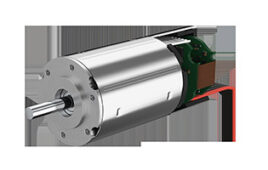
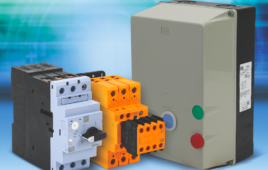
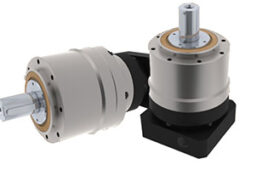
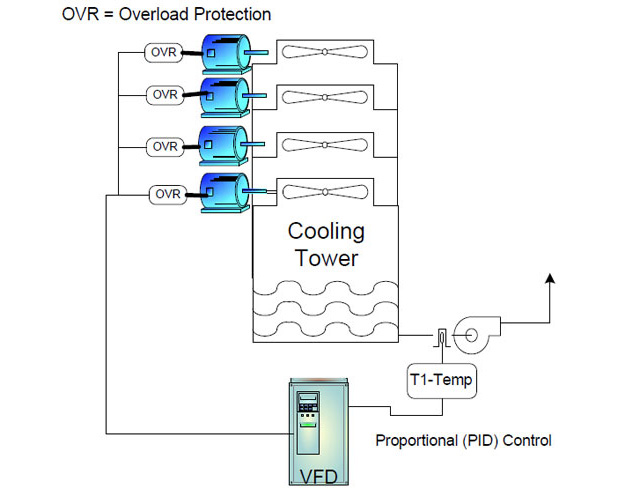
Tell Us What You Think!